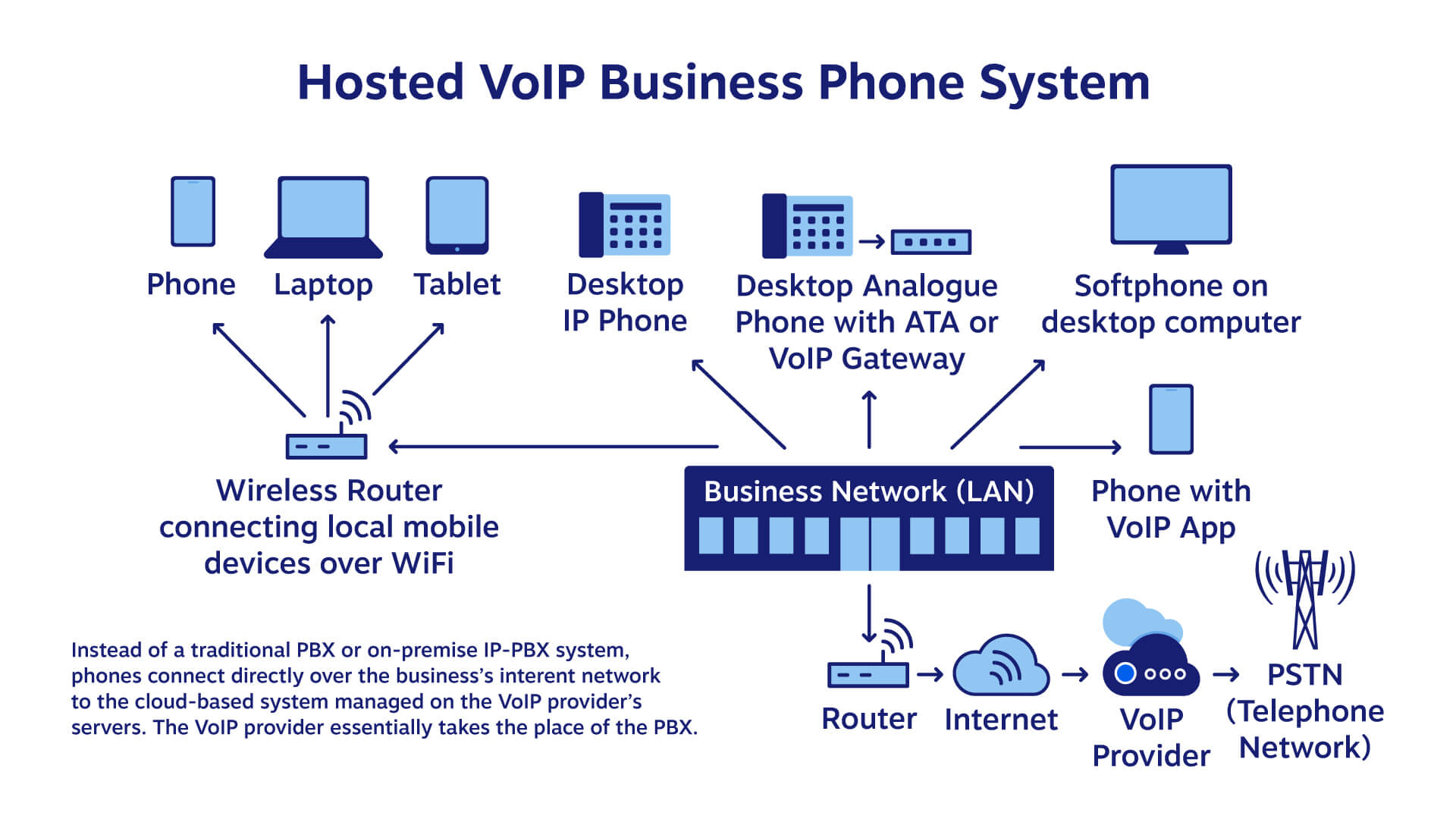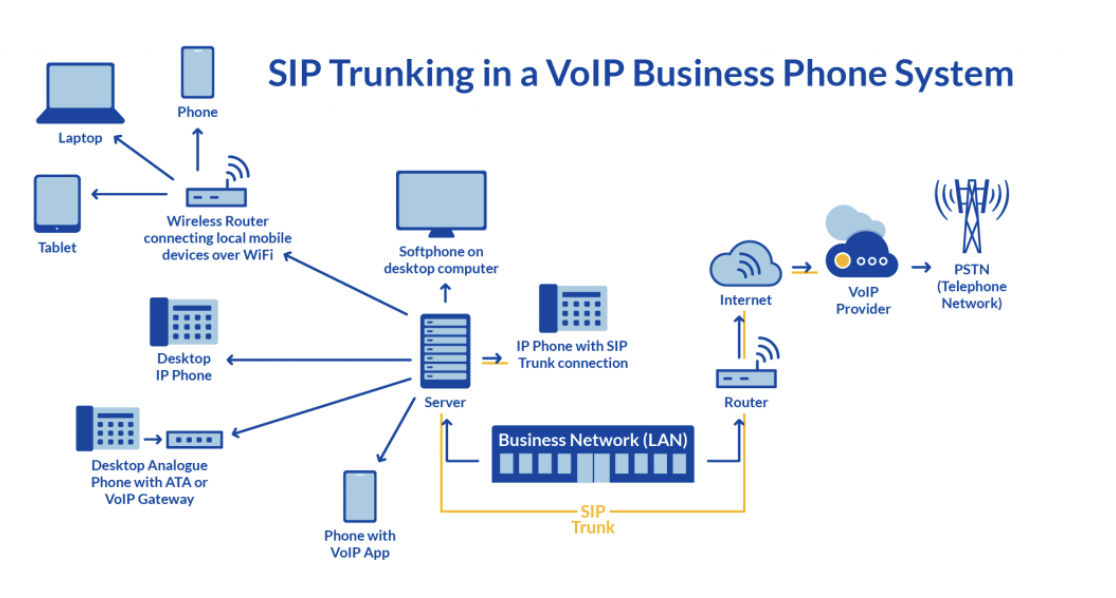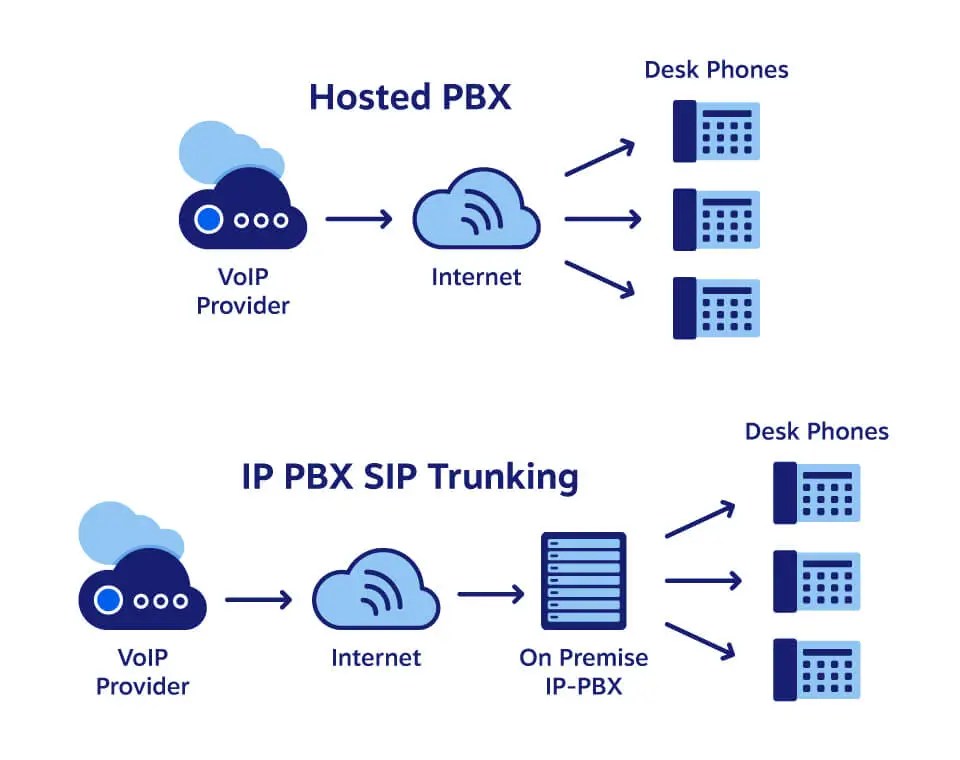You need to join your online business telephone system to the cloud and revel in the advantages of VoIP. One of many first questions that comes up: ought to I’m going with hosted PBX or SIP trunking?
When making calls over the web as an alternative of the standard telephone strains, you want a setup that serves your organization’s wants now and accommodates future development.
Hosted PBX is a cloud-based telephone system answer completely dealt with by a hosted PBX service supplier. All of the tools, upkeep, and options are managed offsite.
SIP trunking connects your present on-premise PBX {hardware} to the web through a SIP trunking service supplier.
On this information, we’ll discover each options, assess their execs and cons, and enable you to decide the very best match for your online business — whether or not it’s adopting a hosted PBX system or integrating SIP trunks together with your present tools.
What Is a Hosted PBX?
A hosted personal department change (PBX) is a phone system that’s managed fully off-site by a third-party service supplier. It connects on to the general public switched phone community (PSTN) over the web.
In different phrases, an organization that implements a hosted PBX answer doesn’t must put money into, personal, or preserve any bodily infrastructure, tools, or software program in-house to have a dependable enterprise telephone system.
A hosted PBX system delivers key phone providers with out pricey tools. Finish customers join VoIP telephones to the cloud-based platform managed by the supplier.
You might also come throughout digital PBX, cloud PBX, cloud telephone system, or hosted VoIP as different names for hosted PBX. These all confer with telephone programs delivered over the web by an exterior supplier moderately than run domestically.
At a technical stage, hosted PBXs use Voice over Web Protocol (VoIP) know-how and Session Initiation Protocol (SIP) to route calls. SIP is a signaling protocol that permits communication classes, like voice calls, to be managed throughout IP networks.
The hosted PBX supplier homes and manages all the required SIP servers on their finish. This eliminates the necessity for a corporation to put money into its personal on-premise PBX {hardware}.
The standard and reliability of the communications system, nonetheless, is determined by the community.
Advantages of a hosted PBX system
Hosted PBX is deployed rapidly and simply, usually inside a day. As a result of it’s offered by an Web Telephony Service Supplier (ITSP), all you must begin utilizing VoIP communications with a hosted PBX are IP telephones or softphones and a steady web connection.
With hosted PBX, there’s no want for a bodily on-premises PBX system and {hardware}. You’ll by no means have to fret about upkeep prices, PBX software program, and {hardware} upgrades, or service downtime.

Hosted PBX gives lots of the similar advantages that customary VoIP telephone providers present, akin to:
- Managing and routing incoming/outgoing calls
- Dealing with transfers, holds, and name forwarding
- Recording calls
- Convention calling
- Auto attendants and interactive voice menus
- Voicemail internet hosting
Moreover, hosted PBX delivers these crucial enterprise telephone system options with out the excessive setup prices of latest on-premise {hardware} or continued tools alternative/upgrades. This gives companies important value financial savings and administration effectivity.
Small companies can implement a completely practical PBX telephone system simply and affordably by way of a cloud service supplier. You’ll get rid of the complexity and bills of sustaining an on-site PBX answer.
Drawbacks
Like several enterprise telephone service, hosted PBX isn’t with out its challenges. Listed here are some widespread downsides and pitfalls you’ll come throughout.
- Reliance on web connectivity. In case your web goes down, your telephones go down. This may be disrupted by energy outages, cable cuts, and so forth.
- Audio high quality points. Name high quality over web strains is usually not so good as conventional telephone strains. This may result in uneven audio or dropped calls.
- Restricted flexibility. It’s important to work inside the options and capabilities provided by your hosted PBX supplier. Customization choices are sometimes extra restricted.
- Safety considerations. Your communications reside in your supplier’s servers moderately than your individual personal community. It’s important to guarantee your supplier has robust safety measures in place.
What Is SIP Trunking?
SIP trunking is a VoIP service that connects your present on-premise PBX telephone system to the web through a SIP supplier. It allows you to leverage your organization’s present {hardware} PBX funding already put in and managed on-site by your IT workers.
For a extra resilient system much less reliant on web uptime, many organizations deploy SIP trunking alongside an present on-premise PBX.
SIP trunking ports PBX telephone calls onto the IP community through a main fee interface (PRI). This achieves voice-over IP value effectivity, characteristic enhancements, and long-distance financial savings.
A SIP trunk acts as a digital telephone line, permitting calls to be routed over the web moderately than a standard PSTN line.
SIP trunking gives larger versatility, as SIP trunks can carry not solely voice calls but in addition video, e-mail, SMS, and different communication information all on the identical line. You don’t want extra strains in any other case required to entry the web or ship faxes.
In contrast to hosted PBX options the place a third-party supplier homes all the required tools offsite, SIP trunking requires that your online business already has an IP-PBX telephone system onsite that may interface with SIP trunks or a VoIP gateway to attach your present conventional PBX system to a SIP supplier.
It will rely in your present enterprise telephone system setup.
Advantages of SIP trunking
With out SIP in place, your online business communications depend on separate infrastructures for voice and information. This fragmented system struggles with name volumes and leaves you susceptible to outages.
With SIP trunking, communication turns into extra dependable and resilient by way of consolidation, together with:
- Instantaneous name routing, transfers, forwarding
- Unified messaging
- Video and internet conferencing
- Seamless information change

If you have already got a {hardware} PBX, migrating to SIP trunking is straightforward and enhances your telephony capabilities. You’ll get pleasure from extra options, value financial savings, and improved enterprise continuity in comparison with standard analog or digital telephone strains.
Drawbacks
What are some widespread challenges with SIP trunking?
- Extra advanced setup. SIP trunking requires correctly configuring SIP endpoints, firewall traversal, and your PBX system. Extra complexity could cause extra errors.
- Tough troubleshooting. Name high quality and connectivity points might be more durable to troubleshoot in comparison with conventional telephone strains. Extra networking data is often required.
- Emergency calling points. Making correct 911/emergency calling work over SIP trunks requires some further configuration steps which might be steadily neglected.
- Supplier dependence. You depend on your SIP supplier for name connectivity. If they’ve an outage, your telephones can be down until you may have redundancy in place.
Hosted PBX vs. SIP Trunking: Key Variations
Let’s have a look at every of the principle differentiators between these two choices.

1. Preliminary prices
Hosted PBX requires a decrease upfront funding because the service supplier homes all the required PBX tools offsite.
You merely must buy IP telephones and guarantee you may have a stable web connection. Any routers/switches are pretty cheap.
SIP trunking lets you leverage the worth from present on-premise PBX investments. Nonetheless, there could also be some improve prices related to making a {hardware} PBX IP-enabled or including a VoIP gateway to attach an analog system to SIP trunks.
These upgrades can vary from $500-$2,000 relying in your setup.
2. Ongoing charges
Hosted PBX suppliers usually cost per consumer line, usually with limitless calling plans starting from $15-$50 per telephone line monthly. You’ll pay for the variety of strains/concurrent calls wanted. Additional charges could apply for add-ons.
SIP trunking additionally fees per consumer month-to-month, with customary charges within the vary of $20-$50 monthly per individual. Nonetheless, minute bundles, variety of channels supported, service tiers, and extra options influence ongoing charges.
3. Upkeep and administration
With a hosted VoIP answer, the service supplier handles all server, software program, and telephone system upkeep offsite. You handle fundamental consumer provides/adjustments by way of a simple admin portal with no need deep technical abilities.
For SIP trunking with an on-premise PBX, your individual IT workers is answerable for the continued upkeep of PBX {hardware} and software program, putting in any updates, making certain safety insurance policies are utilized, and troubleshooting any points. This requires devoted in-house experience.
4. Geographical flexibility
A hosted PBX allows staff to entry telephone system options remotely so long as they’ve an web connection. They will use softphones, internet telephones, and cellular apps. It’s ideally suited for employees that work at home or journey steadily.
VoIP telephone providers can use multi-node registrations near worker places to optimize name high quality and reliability.
SIP trunking additionally helps distant and cellular employees by way of near-unlimited connectivity. Your VoIP supplier can equip residence workplace employees with a devoted line tied to their work telephone quantity and extension.
Flexibility relies upon considerably on licensing guidelines and performance extensions of the PBX platforms.
5. Name high quality
For hosted PBX, name high quality relies upon on the web connection since all site visitors goes over the general public web. An outage or congested bandwidth degrades audio and reliability so you must assess the variety of concurrent calls anticipated.
SIP trunking makes use of personal IP community connections for clearer, safer name audio.
Devoted strains stop congestion points. It really works effectively for prime name volumes throughout a bigger worker base. On-premise PBX additionally creates localized name management separate from different community functions.
6. Scalability
Hosted PBX is right for smaller companies which have restricted plans for enterprise development or enlargement to a number of places. Scalability is restricted primarily based on out there web bandwidth as all calls route on-line.
SIP trunking readily accommodates bigger corporations that steadily rent new workers. It additionally helps companies with present or plans to unfold operations over a number of geographical websites.
7. Safety
With hosted options, safety ranges rely closely on the particular insurance policies and protections put in place by your chosen service supplier at their offsite information facilities. You’ve got much less visibility and management in comparison with an on-premise system.
For SIP trunking with on-premise tools, you configure safety guidelines and insurance policies straight by yourself PBX system. This supplies extra sturdy safety, uptime ensures, and devoted connectivity unaffected by different community site visitors.
Ought to You Select Hosted PBX or SIP Trunking?
When deciding between a hosted PBX answer or SIP trunking, there are a number of key components to think about:
| Characteristic | Hosted PBX | SIP Trunking |
|---|---|---|
| Deployment | Cloud-based; no on-premise {hardware} required | Sometimes requires an on-premise IP PBX system or telephone system |
| Options | Your IT workforce manages the telephone system plus SIP trunks | Supplies name connectivity. Extra restricted built-in options, depending on telephone system capabilities. |
| Value Construction | Month-to-month per-user payment plus utilization fees | Month-to-month per-channel or per-trunk fees solely |
| IT Administration | Managed by hosted PBX supplier | Scales by including SIP trunks, require telephone system capability administration |
| Scalability | Simply scalable up and down as enterprise wants change | Scales by including SIP trunks, requires telephone system capability administration |
👉 When to decide on hosted PBX
Hosted PBX is greatest fitted to:
- Companies that need an opex month-to-month cost mannequin with out giant upfront capital expenditures
- Firms with restricted inner IT assets or experience
- Organizations that want a full-featured VoIP telephone system with unified communications capabilities
- Rising corporations that require frequent consumer or characteristic additions/adjustments
👉 When to decide on SIP trunking
SIP trunking makes extra sense for:
- Firms with present on-premise telephone programs trying to cut back telecom prices
- Companies with bigger IT groups and telecom experience
- Organizations that simply want fundamental voice connectivity with out superior options
- Firms that want to retain present telephone system funding whereas transitioning to cloud
The precise answer is determined by your finances, options wants, development plans, and IT capabilities.
Assess each choices contemplating long-term targets, assets, and complete value of possession. With planning, both can allow communication success.
Listed here are some execs and cons to pay attention to.
| System | Execs | Cons |
|---|---|---|
| Hosted PBX | Easy setup and administration by way of a supplier portal Scales simply by including hosted seats Extra sturdy built-in mobility options No on-premise {hardware} to take care of |
Month-to-month per-user charges increased than SIP trunks Name high quality depends on web connectivity Much less customizable than SIP trunking |
| SIP Trunking | Solely pay for Trunk capability required Leverages present PBX funding Extremely customizable and integrates with the tech stack Name high quality primarily based on the inner community |
Requires on-premise PBX funding IT assets wanted to handle trunks Scaling means including PBX capability Catastrophe restoration requires redundancy |
Begin By Selecting the Proper VoIP Supplier
When deciding between a hosted PBX and SIP trunking, companies should fastidiously consider their distinctive wants and priorities.
Nonetheless, selecting a versatile, feature-rich Unified Communications as a Service (UCaaS) supplier like Nextiva lets companies reap the advantages of each applied sciences in a single seamless platform.
Nextiva gives a dependable, cloud telephone system with a broad array of communication and collaboration instruments to attach distributed workforces.
With limitless calling plans, clever name routing options, and built-in catastrophe restoration, Nextiva empowers productiveness whereas simplifying IT administration.
Nextiva additionally supplies tailor-made options for companies looking for SIP trunking with no disruption to your present service.
Think about an environment friendly and empowered buyer help workforce on one aspect and pleased clients on the opposite. That is precisely what a feature-rich IP-based system will carry you.
Appears like what you’re on the lookout for?
Get in contact with our workforce in order that your communications setup can scale with you.

